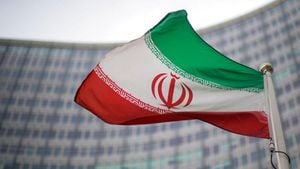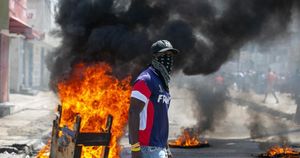On the stormy battleground of the Middle East, the Israel-Hamas-Hezbollah conflict has gripped the world’s attention, drawing expressions of concern, diplomacy, and military strategies from various international actors. The situation escalated dramatically after the onslaught of attacks on October 7, 2023, impacting not only the immediate regions of Israel and Gaza but rippling through global geopolitics. How have countries reacted to this longstanding turmoil, especially as new developments continue to unfurl?
The latest flare-up began when Hamas launched unprecedented assaults on Israeli territories, resulting in the tragic deaths of around 1,200 Israelis, many of whom were civilians. This aggressive action led to swift retaliation from Israel, which struck back with heavy military air strikes across Gaza. Fatalities surged, and reports indicated over 43,800 Palestinian casualties, predominantly women and children, as described by the Health Ministry in Gaza.
Meanwhile, on the borders, Hezbollah made its presence felt by launching rockets at Israel, reportedly as a strategic extension of Hamas’ aggression. This marked the commencement of larger military operations, with Israel carrying out air strikes across Lebanon. The US, witnessing these developments, has been vocal about its stance, tending to throw its weight behind Israel.
Through these actions, the conflict has burgeoned beyond borders, drawing smaller nations connected through myriad treaties and accords. Leading the charge for moderation, the United States has been engaging Lebanon through Amos Hochstein, aiming to facilitate potential ceasefires and mitigate the threats posed by both Hamas and Hezbollah. Yet, the steadfastness of their operations raises questions about real peace prospects.
On the economic front, the devastation has prompted significant repercussions for both Israel and Lebanon. The conflict's toll has been estimated at $66 billion, affecting multiple sectors and raising immediate financial concerns. Lebanon has incurred about $8.5 billion in losses due to the war, mirroring the sentiments echoed by the World Bank.
Even amid the chaos, the European Union showed signs of discontent with Israel's handling of the situation. Josep Borrell, the EU's foreign policy chief, signaled possible sanctions, urging the bloc to suspend political dialogues with Israel, citing potential human rights violations during the bombardment of Gaza. This move provoked mixed reactions within EU members, reflecting the divide on how to approach the multifaceted conflict.
Israel's Prime Minister Benjamin Netanyahu, facing scrutiny over his government’s handling of the crisis, appears to be leaning heavily on military options rather than pursuing diplomatic solutions. Critics within Israel have expressed their frustrations, arguing his continued military actions do not align with national security and are rather focused on consolidative power amid political vulnerabilities.
Hezbollah has remained defiant, even amid the kind of lethal strikes seen over the weekend, which killed key members of the group. Sources detail how the Israeli military expanded operations to touch on sensitive Lebanese territory, marking the culmination of increasingly brazen tactical decisions.
But will all this lead to de-escalation, or merely deepen hostilities? The 2006 Israel-Hezbollah conflict was relatively contained, lasting only weeks; now, the battle has gone on for more than a year, which raises the specter of broader, more entrenched military conflict.
Lebanese officials are weighing the ceasefire proposals from the US, which are speculated to offer limited monitoring elements from international bodies. The reluctance from Hezbollah raises certain issues about trust and sovereignty, as both the group and Lebanese leaders express significant skepticism about the US-drafted proposals.
Indeed, the operational framework appears to be at odds with realities on the ground. Hezbollah’s previous threats about retaliatory strikes pit it against uncertainties presented by US-led initiatives. A Lebanon-Israel maritime border deal proposed years prior is now perceived through this tumultuous lens, even as recent spats of violence force them to reassess potential negotiations.
The image of the urban warfare spreading from Gaza to city streets like those of Beirut reflects the stark human cost of these conflicts. Civilians attempting to go about their lives bear the brunt of decisions made far beyond their control. Streets once vibrant are now redolent with the chaos, as sirens echo across districts, bringing with them increasing levels of anxiety and hopelessness.
And yet, attentive eyes remain fixed upon efforts to mediate peace from outside, with statements from influential diplomats only partially assuaging fears. It seems both sides are bent on proving dominance rather than yielding ground. The EU’s urge to leverage pressure against Israel met with nationalistic sentiments stands as a stark reminder of the diverging paths nations take through this crisis.
Each passing day seems to suggest the volatility of the situation could unravel, fueling doubts about future diplomatic successes. The question looms larger: What will it take for genuine peace-making efforts to gain traction amid such widespread suffering? Key players across the globe must confront the exemplifying realities of why peace has historically eluded the region and strategize appropriately. Ensuring the voices of the disenfranchised populations are centered may pave the way toward viable solutions.
Optimism for resolving the conflict remains grim, as countless lives are drastically altered by violence and instability. The historical grievances seem insurmountable, but perhaps the solution lies within the nuance of negotiations spanning multiple stakeholders across the region.



